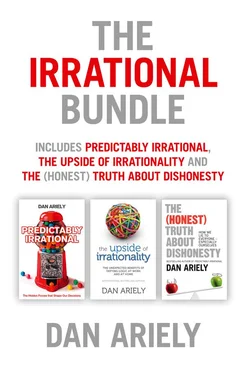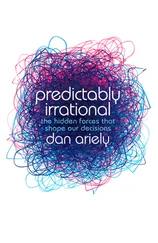Dan Ariely - The Irrational Bundle
Здесь есть возможность читать онлайн «Dan Ariely - The Irrational Bundle» — ознакомительный отрывок электронной книги совершенно бесплатно, а после прочтения отрывка купить полную версию. В некоторых случаях можно слушать аудио, скачать через торрент в формате fb2 и присутствует краткое содержание. Жанр: unrecognised, на английском языке. Описание произведения, (предисловие) а так же отзывы посетителей доступны на портале библиотеки ЛибКат.
- Название:The Irrational Bundle
- Автор:
- Жанр:
- Год:неизвестен
- ISBN:нет данных
- Рейтинг книги:3 / 5. Голосов: 1
-
Избранное:Добавить в избранное
- Отзывы:
-
Ваша оценка:
- 60
- 1
- 2
- 3
- 4
- 5
The Irrational Bundle: краткое содержание, описание и аннотация
Предлагаем к чтению аннотацию, описание, краткое содержание или предисловие (зависит от того, что написал сам автор книги «The Irrational Bundle»). Если вы не нашли необходимую информацию о книге — напишите в комментариях, мы постараемся отыскать её.
The Irrational Bundle — читать онлайн ознакомительный отрывок
Ниже представлен текст книги, разбитый по страницам. Система сохранения места последней прочитанной страницы, позволяет с удобством читать онлайн бесплатно книгу «The Irrational Bundle», без необходимости каждый раз заново искать на чём Вы остановились. Поставьте закладку, и сможете в любой момент перейти на страницу, на которой закончили чтение.
Интервал:
Закладка:
Burning Man has many extraordinary aspects, but for me one of the most remarkable is its rejection of market norms. Money is not accepted at Burning Man. Rather, the whole place works as a gift exchange economy—you give things to other people, with the understanding that they will give something back to you (or to someone else) at some point in the future. Thus, people who can cook might fix a meal. Psychologists offer free counseling sessions. Masseuses massage those lying on tables before them. Those who have water offer showers. People give away drinks, homemade jewelry, and hugs. (I made some puzzles at the hobby shop at MIT, and gave them to people. Mostly, people enjoyed trying to solve them.)
At first this was all very strange, but before long I found myself adopting the norms of Burning Man. I was surprised, in fact, to find that Burning Man was the most accepting, social, and caring place I had ever been. I’m not sure I could easily survive in Burning Man for all 52 weeks of the year. But this experience has convinced me that life with fewer market norms and more social norms would be more satisfying, creative, fulfilling, and fun.
The answer, I believe, is not to re-create society as Burning Man, but to remember that social norms can play a far greater role in society than we have been giving them credit for. If we contemplate how market norms have gradually taken over our lives in the past few decades—with their emphasis on higher salaries, more income, and more spending—we may recognize that a return to some of the old social norms might not be so bad after all. In fact, it might bring quite a bit of the old civility back to our lives.
Reflections on Social Norms: Lessons on Gifts
When we mix social and monetary norms, strange and undesirable things can happen. For example, if you walk your date home after a wonderful evening together, don’t mention how much the evening set you back. That is not a good strategy for getting a passionate good-night kiss. (I certainly do not recommend this as an experiment, but if you do try it, let me know how it turns out.) Dating, of course, is just one arena in which we can mess up a social relationship by introducing financial norms, and this danger lurks around many corners.
On some level we all know this, and therefore we sometimes deliberately make decisions that do not fall into line with rational economic theory. Think of gifts, for example. From a standard economic perspective, they are a waste of money. Imagine that you invite me to your home for dinner one evening, and I decide to spend $50 on a nice bottle of Bordeaux as a token of gratitude. There are some problems with this decision: You might not like Bordeaux. You might have preferred something else: a copy of Predictably Irrational, a DVD of Citizen Kane, or a blender. This means that the bottle of wine that cost me $50 might be worth, at most, $25 to you in terms of its utility. That is, for $25 you could get something else that would make you just as happy as my $50 bottle of wine.
Now, if giving gifts was a rational activity, I would come to dinner and say, “Thank you for inviting me for dinner. I was going to spend $50 on a bottle of Bordeaux, but I realize that this might provide you with far less happiness than $50 in cash.” I peel off five $10 bills, hand them to you, and add, “Here you go. You can decide how best to spend it.” Or maybe I would give you $40 in cash and make us both better off—not to mention saving myself the trouble of shopping for wine.
Although we all realize that offering cash instead of gifts is more economically efficient, I don’t expect that many people will follow this rational advice, because we all know that doing so will in no way endear us to our hosts. If you want to demonstrate affection, or strengthen your relationship, then giving a gift—even at the risk that it won’t be appreciated as much as you hoped—is the only way to go.
So imagine two scenarios. Let’s say it’s the holidays, and two different neighbors invite you to their parties in the same week. You accept both invitations. In one case, you do the irrational thing and give Neighbor X a bottle of Bordeaux; for the second party you adopt the rational approach and give Neighbor Z $50 in cash. The following week, you need some help moving a sofa. How comfortable would you be approaching each of your neighbors, and how do you think each would react to your request for a favor? The odds are that Neighbor X will step in to help. And Neighbor Z? Since you have already paid him once (to make and share dinner with you), his logical response to your request for help might be, “Fine. How much will you pay me this time?” Again, the prospect of acting rationally, financially speaking, sounds deeply irrational in terms of social norms.
The point is that while gifts are financially inefficient, they are an important social lubricant. They help us make friends and create long-term relationships that can sustain us through the ups and downs of life. Sometimes, it turns out, a waste of money can be worth a lot.
Reflections on Social Norms: Benefits in the Workplace
The same general principles regarding social norms also apply to the workplace. In general, people work for a paycheck, but there are other, intangible benefits we get from our jobs. These are also very real and very important, yet much less understood.
Often, when I’m on a flight and the people sharing the row with me don’t immediately put their headphones on, I enter into an interesting discussion with one of them. Invariably, I learn a lot about my neighbor’s work, work history, and future projects. On the other hand, I discover very little about the person’s family, favorite music, movies, or hobbies. Unless my neighbor gives me a business card, I almost never learn his or her name until the moment we are both about to leave the plane. There are probably many reasons for this, but I suspect that one of them is that most people take a lot of pride in their work. Of course this may not be true of everyone, but I think that for many people the workplace is not just a source of money but also a source of motivation and self-definition.
Such feelings benefit both the workplace and the employee. Employers who can foster these feelings gain dedicated, motivated employees who think about solving job-related problems even after the workday is over. And employees who take pride in their work feel a sense of happiness and purpose. But in the same way that market norms may undermine social norms, it may be that market norms also erode the pride and meaning people get from the workplace (for example, when we pay schoolteachers according to their students’ performance on standardized tests).
Imagine that you work for me, and that I want to give you a year-end bonus. I offer you a choice: $1,000 in cash or an all-expenses-paid weekend in the Bahamas, which would cost me $1,000. Which option would you choose? If you are like most people who have answered this question, you would take the cash. After all, you may have already been to the Bahamas and may not have enjoyed being there very much, or maybe you’d prefer to spend a weekend at a resort closer to home and use the remainder of the bonus money to buy a new iPod. In either case, you think that you can best decide for yourself how to spend the money.
This arrangement seems to be financially efficient, but would it increase your happiness with your work, or your loyalty to the company? Would it make me a better boss? Would it improve the employer-employee relationship in any way? I suspect that both your and my best interests would be better served if I simply didn’t offer you a choice and just sent you on the Bahamas vacation. Consider how much more relaxed and refreshed you would feel, and how well you would perform, after a relaxing weekend of sun and sand, compared with how you would feel and behave after you got the $1,000 bonus. Which would help you feel more committed to your job, more enjoyment in your work, more dedication to your boss? Which gift would make you more likely to stay long hours one night to meet an important deadline? On all of these, the vacation beats the cash hands down.
Читать дальшеИнтервал:
Закладка:
Похожие книги на «The Irrational Bundle»
Представляем Вашему вниманию похожие книги на «The Irrational Bundle» списком для выбора. Мы отобрали схожую по названию и смыслу литературу в надежде предоставить читателям больше вариантов отыскать новые, интересные, ещё непрочитанные произведения.
Обсуждение, отзывы о книге «The Irrational Bundle» и просто собственные мнения читателей. Оставьте ваши комментарии, напишите, что Вы думаете о произведении, его смысле или главных героях. Укажите что конкретно понравилось, а что нет, и почему Вы так считаете.












